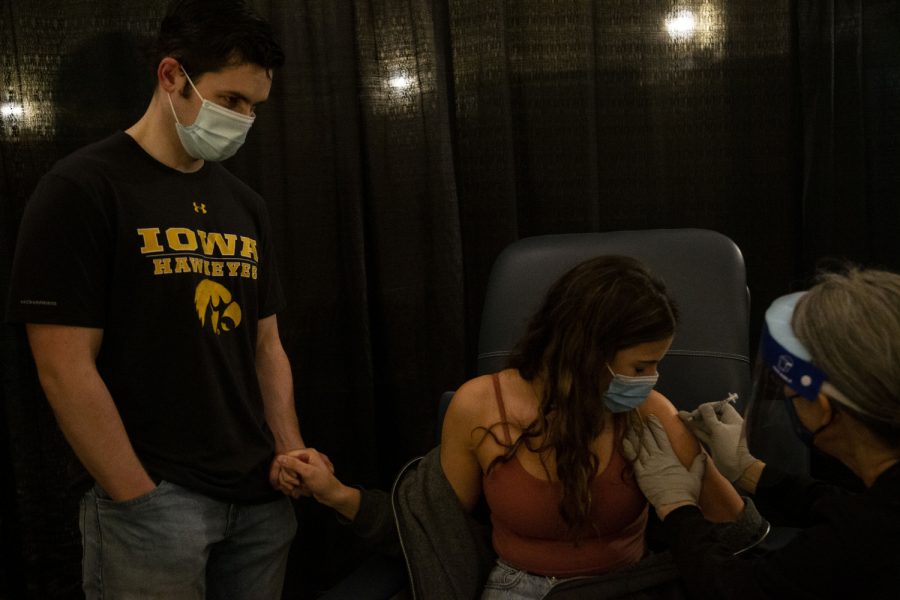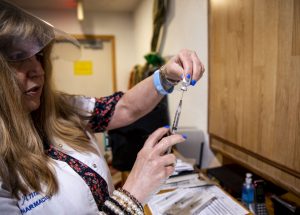Over 100 higher education institutions requiring vaccine for fall, University of Iowa not on the list
The state Board of Regents will not mandate the COVID-19 vaccine, but Regents President Mike Richards encourages students to get vaccinated
Fourth-year students, Grace Cannell and Ethan Fobbe, hold hands while Cannell receives her Pfizer COVID-19 vaccine at the Iowa Memorial Union at the University of Iowa on Wednesday, April 21, 2021.
May 2, 2021
More than 100 higher education institutions in the U.S. will require students to receive the COVID-19 vaccine for the fall semester. But Iowa universities won’t be among them.
The majority of COVID-19 vaccine-mandated universities are private institutions; public institutions must get state approval to require COVID-19 vaccinations.
Some public secondary education institutions — like the University of California and California State University systems — will mandate COVID-19 vaccinations for students, faculty, and staff in the fall after formal approval of the vaccine from the Food and Drug Administration.
With the exception of Cleveland State University, public institutions that are mandating the vaccine for the fall, like Rutgers University in New Jersey and the University of Michigan – Ann Arbor, are located in states that voted for the Democratic candidate in the 2020 presidential election, according to data from The Chronicle of Higher Education.
In Iowa, which went ruby red in the 2020 election, the state Board of Regents won’t require COVID-19 vaccinations for students this fall.
Mike Richards, president of the nine-member board, said at the April 14 regents meeting that vaccines will continue to be strongly encouraged, but not mandated on campuses this fall.
“I strongly believe in the effectiveness of vaccinations, and we will continue to make them available and encourage people to get vaccinated, but they will not be required at our three universities,” Richards said.
UI Assistant Vice President for External Relations Jeneane Beck wrote in an email to The Daily Iowan that the university is obligated to follow the guidance of the Board of Regents.
Aaron Scherer, assistant professor of internal medicine in the Carver College of Medicine, said vaccine mandates work to increase vaccination rates but can have unintended consequences such as an increase in medical exemptions for people who don’t need one.
Another public institution system, the University System of Maryland, will require all students and employees to be vaccinated for the fall semester at the system’s institutions.
Mike Lurie, University System of Maryland media relations and web manager, wrote in an email to the DI that the university made its decision for mandatory vaccinations with the advice of experts in public health, infectious disease, and emergency management, and advisory by the Office of the Attorney General throughout the decision-making process.
RELATED: Board of Regents won’t require COVID-19 vaccinations at Iowa’s public universities
“Given the population density and multiple interactions of individuals on our campuses, the USM Chancellor and presidents believe mandating COVID-19 vaccination is necessary for a safe return to campus,” Lurie wrote.
Iowa already requires certain vaccinations for admission. According to UI Student Health, all UI students are required to receive two measles, mumps, and rubella vaccinations, unless they have a religious or medical exemption.
UI Faculty Senate President Joseph Yockey wrote in an email to the DI that several faculty have contacted him to express an interest in seeing a vaccine mandate. Yockey relayed the concerned faculty’s messages to central administration, he wrote.
“I’m happy to see how strongly the UI is promoting the vaccines,” Yockey wrote. “By the time students, staff, and faculty return for the fall, it could be that most people will have already voluntarily chosen to be vaccinated.”
Chief Data Officer for the independent Iowa COVID-19 tracker Sara Willette said the regent universities are doing a good job at setting up vaccination clinics and getting students in and out.
“If the university population has herd immunity, it’s going to be pretty safe at the [UI],” Willette said.
Outgoing UI Undergraduate Student Government President Connor Wooff said despite the UI not having authority to mandate the vaccine, the UI can make receiving the vaccine a positive choice for the student body.
Wooff said USG is partnering with the UI Division of Student Life communications team, and videos and graphics are being released featuring student leaders explaining why they got vaccinated.
“I did a video and there’s many other student leaders who are doing videos and graphics,” Wooff said. “I know that despite our inability to require the vaccine, the university is going to do everything they can to make sure students have access to the vaccine and that they’re encouraging them to get it.”
On April 16, the UI launched a COVID-19 vaccination incentive program by offering a one-time $10 gift card for the Iowa City Downtown District.
Willette said she is optimistic for Johnson County’s COVID-19 mitigation as active infections have leveled off and Johnson County is quickly vaccinating residents, even if COVID-19 case positivity rate is increasing.
“Will masks probably still be a necessity in indoor spaces? Absolutely,” she said. “That is true for everybody everywhere until the pandemic is over.”
Public Information Officer at Johnson County Department of Public Health Susan Vileta said the department has recently seen an uptick in vaccination rates from people ages 16 through 19 in the county. People between 16 and 18 years old are only eligible for the Pfizer vaccine.
Vileta said vaccination rates are lower in the 22-29 age group.
“The further you get away from ages 18 and 19, your parents might have less influence on you, but we are just guessing at this point,” Vileta said.
Scherer said the term “vaccine confidence” covers a broad spectrum of attitudes and behaviors regarding immunization from anti-vaxxers to people who get vaccinated, but still have major concerns of the vaccine’s safety and low confidence in it.
“I think with that younger age group, they are vaccine-hesitant in the sense that they don’t think they are at risk of getting COVID or if they get COVID, they think it’s not going to be that bad for them,” Scherer said. “I think that’s primarily why they’re not getting the vaccine right now. It’s hard to get that group to engage in tough behaviors in general.”






